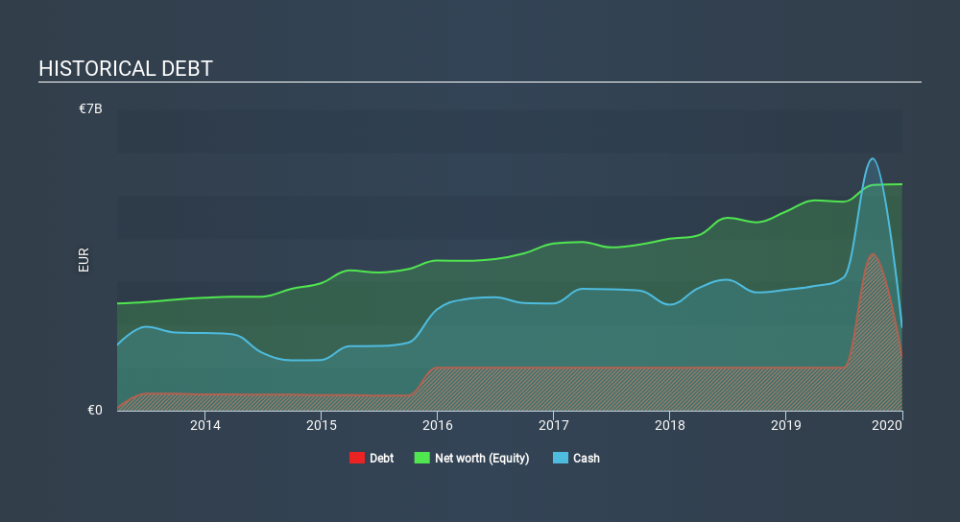Is Dassault Systèmes (EPA:DSY) A Risky Investment?

Legendary fund manager Li Lu (who Charlie Munger backed) once said, 'The biggest investment risk is not the volatility of prices, but whether you will suffer a permanent loss of capital. So it might be obvious that you need to consider debt, when you think about how risky any given stock is, because too much debt can sink a company. Importantly, Dassault Systèmes SE (EPA:DSY) does carry debt. But the more important question is: how much risk is that debt creating?
Why Does Debt Bring Risk?
Generally speaking, debt only becomes a real problem when a company can't easily pay it off, either by raising capital or with its own cash flow. Ultimately, if the company can't fulfill its legal obligations to repay debt, shareholders could walk away with nothing. However, a more usual (but still expensive) situation is where a company must dilute shareholders at a cheap share price simply to get debt under control. Of course, plenty of companies use debt to fund growth, without any negative consequences. The first thing to do when considering how much debt a business uses is to look at its cash and debt together.
Check out our latest analysis for Dassault Systèmes
What Is Dassault Systèmes's Net Debt?
As you can see below, at the end of December 2019, Dassault Systèmes had €1.25b of debt, up from €1.00b a year ago. Click the image for more detail. However, its balance sheet shows it holds €1.95b in cash, so it actually has €695.8m net cash.
How Strong Is Dassault Systèmes's Balance Sheet?
Zooming in on the latest balance sheet data, we can see that Dassault Systèmes had liabilities of €2.13b due within 12 months and liabilities of €6.48b due beyond that. On the other hand, it had cash of €1.95b and €1.35b worth of receivables due within a year. So its liabilities total €5.32b more than the combination of its cash and short-term receivables.
Since publicly traded Dassault Systèmes shares are worth a very impressive total of €33.8b, it seems unlikely that this level of liabilities would be a major threat. But there are sufficient liabilities that we would certainly recommend shareholders continue to monitor the balance sheet, going forward. Despite its noteworthy liabilities, Dassault Systèmes boasts net cash, so it's fair to say it does not have a heavy debt load!
Fortunately, Dassault Systèmes grew its EBIT by 5.0% in the last year, making that debt load look even more manageable. There's no doubt that we learn most about debt from the balance sheet. But ultimately the future profitability of the business will decide if Dassault Systèmes can strengthen its balance sheet over time. So if you're focused on the future you can check out this free report showing analyst profit forecasts.
Finally, while the tax-man may adore accounting profits, lenders only accept cold hard cash. Dassault Systèmes may have net cash on the balance sheet, but it is still interesting to look at how well the business converts its earnings before interest and tax (EBIT) to free cash flow, because that will influence both its need for, and its capacity to manage debt. Happily for any shareholders, Dassault Systèmes actually produced more free cash flow than EBIT over the last three years. That sort of strong cash generation warms our hearts like a puppy in a bumblebee suit.
Summing up
While Dassault Systèmes does have more liabilities than liquid assets, it also has net cash of €695.8m. And it impressed us with free cash flow of €1.1b, being 107% of its EBIT. So is Dassault Systèmes's debt a risk? It doesn't seem so to us. There's no doubt that we learn most about debt from the balance sheet. But ultimately, every company can contain risks that exist outside of the balance sheet. For instance, we've identified 1 warning sign for Dassault Systèmes that you should be aware of.
If you're interested in investing in businesses that can grow profits without the burden of debt, then check out this free list of growing businesses that have net cash on the balance sheet.
If you spot an error that warrants correction, please contact the editor at editorial-team@simplywallst.com. This article by Simply Wall St is general in nature. It does not constitute a recommendation to buy or sell any stock, and does not take account of your objectives, or your financial situation. Simply Wall St has no position in the stocks mentioned.
We aim to bring you long-term focused research analysis driven by fundamental data. Note that our analysis may not factor in the latest price-sensitive company announcements or qualitative material. Thank you for reading.


